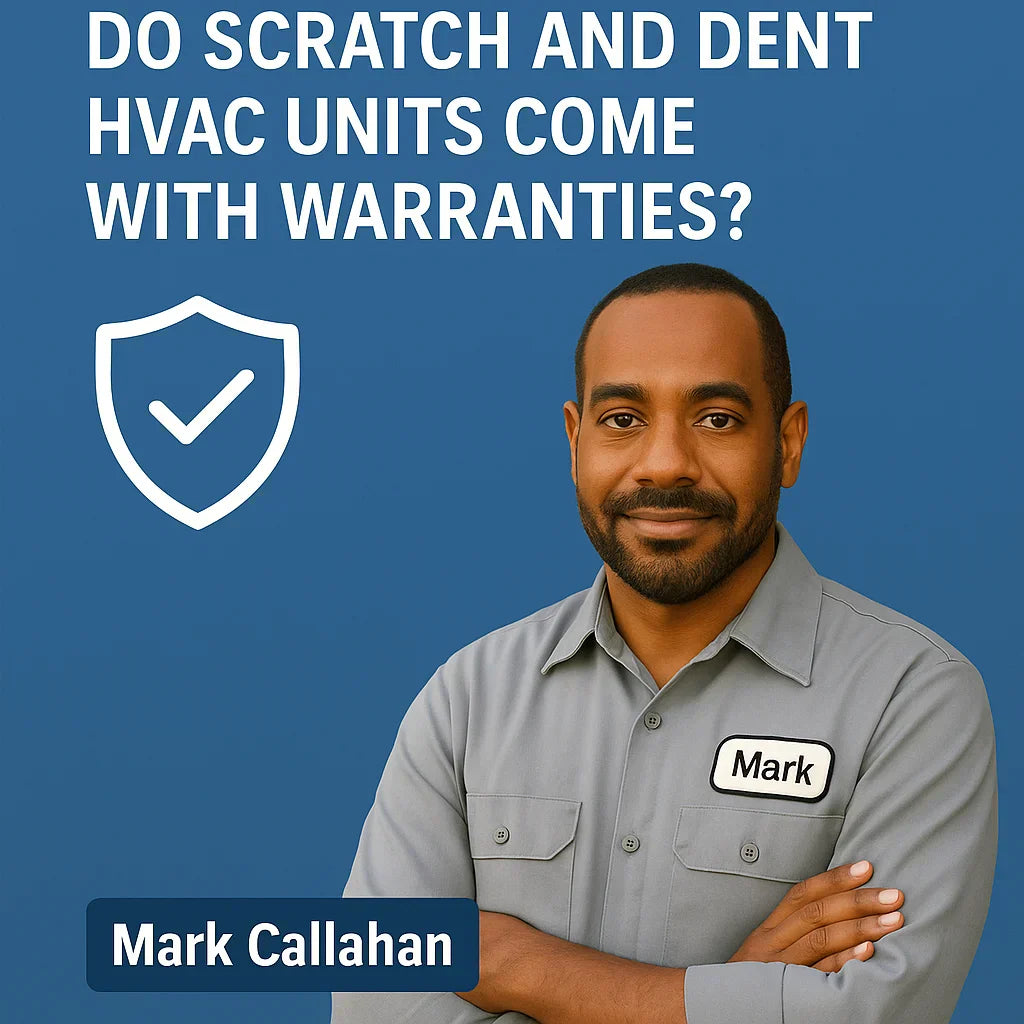🚪 Introduction: Why Warranty Matters
HVAC systems are one of the most significant investments for any homeowner, including budget-focused buyers like Mark Callahan. A warranty protects that investment, giving you peace of mind that if something goes wrong, you won’t face a massive repair bill.
Many homeowners assume that scratch and dent HVAC units are "as-is" with no warranty. This is not always true. Many scratch and dent units retain manufacturer warranties or come with modified warranties, making them a smart, affordable choice if you understand how warranties work before buying.
This guide will help you:
-
Understand standard HVAC warranties
-
Know what happens to warranties on scratch and dent units
-
Ask the right questions before purchasing
-
Verify warranty status
-
Avoid common pitfalls that void warranties
-
Decide if a scratch and dent HVAC unit is the right fit for you
📝 Understanding HVAC Warranties
Most standard HVAC warranties include:
-
Parts Warranty (5–10 years): Covers the cost of replacement parts for factory defects.
-
Compressor Warranty (10+ years): Covers one of the most expensive parts of your system.
-
Limited Labor Warranty (varies): Covers labor costs for specific repairs, though many manufacturers exclude labor.
Warranty validity often depends on:
-
Professional installation by a licensed contractor.
-
Timely registration (often within 30–90 days of installation).
-
Using the system under normal residential conditions.
✅ This Old House: HVAC Warranty Guide for understanding coverage terms.
⚠️ What Happens to Warranties on Scratch and Dent Units?
✅ When Warranties Are Retained:
-
Cosmetic damage only (dents on panels, scratches on paint) usually does not void the manufacturer’s warranty.
-
Units that have been inspected and tested by reputable sellers often still qualify for warranty registration.
⚠️ When Warranties May Be Modified:
-
Some manufacturers may exclude cosmetic parts from warranty claims.
-
Certain sellers may offer limited in-house warranties instead of the manufacturer warranty.
-
The warranty period may be shortened in specific clearance cases.
The key is to confirm the exact warranty details before purchase.
✅ ACHR News: Understanding HVAC Warranties for details on how damage impacts warranties.
🛡️ Questions to Ask Before Buying
To ensure your scratch and dent unit has appropriate coverage, Mark should ask:
-
Does this unit retain its full manufacturer warranty?
-
If not, what warranty is included?
-
Are there any exclusions due to cosmetic damage?
-
Who handles warranty registration?
-
Who should I contact for a warranty claim?
-
What is the warranty duration?
✅ Tip: Get all answers in writing before purchase.
🔎 How to Verify Warranty Status
Before buying, you can:
-
Request the model and serial number.
-
Contact the manufacturer with the serial number to confirm warranty eligibility.
-
Verify the manufacture date (to ensure it isn’t out of coverage by age).
-
Ask the seller to confirm the unit’s testing status.
After purchase:
-
Register your unit immediately using the manufacturer’s online system.
-
Keep a copy of your purchase receipt for claims.
-
Retain installation documentation if your warranty requires proof of professional installation.
✅ Energy Star: HVAC System Guide for registration and maintenance best practices.
✅ Consumer Reports: HVAC Buying Guide for pre-purchase checks.
🛑 Common Mistakes That Void Warranties
Mark should avoid these common pitfalls:
-
DIY Installation when professional installation is required for warranty validation.
-
Failing to register the unit within the manufacturer’s specified period.
-
Using the system outside recommended usage conditions.
-
Modifying the unit without manufacturer approval.
-
Ignoring maintenance requirements outlined in the warranty.
✅ Energy.gov: Heating and Cooling for tips on maintaining your system to protect your warranty.
✅ Federal Trade Commission: Warranty Protections for your legal rights under warranty laws.
🏠 Why Buying from a Reputable Seller Matters
Purchasing a scratch and dent unit from a reputable supplier like The Furnace Outlet is critical for warranty protection because:
-
Units are tested and verified for functionality.
-
The seller will confirm which warranty applies.
-
Clear documentation is provided for your records.
-
They can guide you on registration steps.
-
Some offer in-house warranties if the manufacturer warranty is unavailable.
Avoid purchasing from unknown marketplace sellers with unclear terms, as you risk receiving a unit with no warranty protection.
🧰 Real-World Example: Mark’s Experience
Mark purchased a scratch and dent Goodman heat pump system with a dent on the rear panel. The Furnace Outlet confirmed the unit retained its full 10-year parts warranty since the damage was cosmetic only.
Because Mark registered his unit promptly and hired a licensed HVAC installer, he preserved his warranty, ensuring peace of mind while saving over $900 compared to buying a flawless unit.
🏆 Is a Scratch and Dent HVAC Unit Worth It?
Yes, if warranty coverage is secured.
Scratch and dent HVAC units can save you hundreds to thousands of dollars while still providing reliable performance under warranty if:
-
Cosmetic damage does not bother you.
-
You confirm and document warranty coverage.
-
You purchase from reputable sellers.
-
You install and register the unit properly.
It may not be the best fit if:
-
You want a pristine appearance.
-
The unit comes with no warranty and you are not comfortable taking the risk.
-
You plan to sell your home soon and prefer a flawless system for buyer confidence.
✅ Conclusion: Save Without Sacrificing Protection
For homeowners like Mark Callahan looking to maximize budget while protecting comfort, scratch and dent HVAC systems with warranty coverage offer the perfect balance.
Before you buy:
-
Confirm warranty coverage.
-
Register your unit promptly.
-
Use licensed installers to protect your warranty.
If you want to save big while maintaining peace of mind, check out the Scratch and Dent HVAC Collection at The Furnace Outlet today to find your next system confidently.
In the next topic we will know more about: How Much Can You Really Save with Scratch and Dent HVAC Systems?







